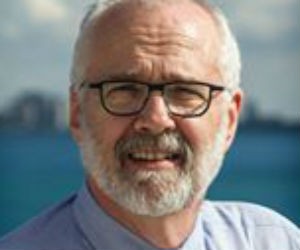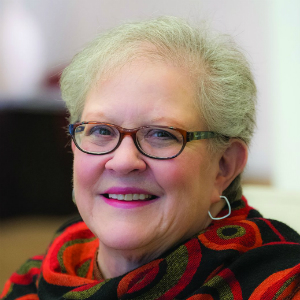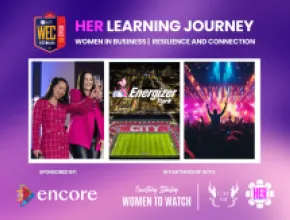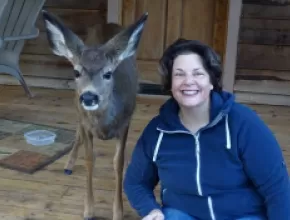Three professors in our industry graciously gave their time to help us understand what they teach now and what we may need as part of the curriculum, whether in a formal or informal setting, for our industry’s educational future.
I’ve known these three—Bill Host (BH), Seungwon (“Shawn”) Lee (SL) and Rhonda Montgomery (RM)—for years and appreciate that they continue to contribute to the body of knowledge for our industry. Ashley Akright, a woman I’ve known and had the privilege of mentoring and being mentored by since we met through the PCMA student programs when she was in college, has added her thoughts as a relatively recent graduate who chose the service side of our industry. Her interview appears as a sidebar to this interview.
The format for this and other Friday With Joan newsletters has been chosen to allow other voices to be heard and to bring forth ideas for the industry to explore. If there are people you think should be interviewed and topics explored for a future Friday With Joan, please contact me at FridaywithJoan@aol.com.
And, of course, add your comments below or in the comments section of the blog.
Q1. Tell us about your and your involvement in the hospitality and meetings industry.
Bill Host (BH): [Bio provided by Bill Host] With over 25 years of experience in all facets of meetings and special events management, Bill was named to the faculty of the Manfred Steinfeld School of Hospitality and Tourism Management at Roosevelt University in Chicago in September 2001.
Prior to joining Roosevelt University, Bill was president of HOST Meetings & Events Management, an independent meeting planning and logistics firm where for eight years he managed the meetings and conferences for a wide variety of regional and national associations whose budgets were under $1 million.
Prior to forming HOST Meetings & Events in 1993, Bill held the title of director of conventions and meetings for the Automotive Service Industry Association, where he managed five annual conferences with attendance ranging from 350 to 2,500.
A certified meeting professional since 1990, Bill also earned a Master of Science degree in Hospitality and Tourism Management from Roosevelt University in 1999 and a BA in Humanities from Kutztown University, in Kutztown, Pa. He served on the MPI Chicago Area Chapter's Board of Directors from 1994-1997 and serves on local committees for both MPI-Chicago Area Chapter and PMCA's Greater Mid-West Chapter.
Bill is studying the history of hotels and meetings in Chicago from the Great Fire of 1871 to the end of the First World War (1918). In the process of the study he has amassed a collection of 2,000 postcards and a variety of ephemera representing Chicago hotels, venues and events of this historic era. Some of these cards were recently published in Early Chicago Hotels, a book he co-authored.
Bill has been honored by numerous organizations: the Association Forum of Chicagoland honored him with the Association Programming Achievement Award in 1989; he was installed in the MPI Chicago Area Chapter Hall of Fame in 2006; and most recently was named by the PCMA Education Foundation for Lifetime Achievement as its 2010 Educator Honoree.
Seungwon “Shawn” Lee (SL): I was born in South Korea and previously worked as a computer programmer, professional development trainer, association and corporate meeting and event planner for more than 17 years before joining academia. I received my Master's degree from The George Washington University and Ph.D. from Virginia Tech in Hospitality Management with a meeting management and technology concentration.
I am an associate professor of meeting/event management and technology and lead the program as a department chair at George Mason University. My textbook, with two international co-authors, The 21st Century Meeting and Event Technology: The Powerful Tool for Better Planning, Marketing, and Evaluation, was published in 2016. I can be contacted at drconvention@hotmail.com.
Rhonda Montgomery (RM): I’m the department chair of the Food & Beverage and Event Management Department at UNLV, where I’ve been teaching for the past 22 years [of the 35 I’ve taught at the university level]. I’ve taught practically every class in the meetings and events area [at] either UNLV or the University of South Carolina. My Bachelors and Master's both came from Purdue University and my PhD from the University of South Carolina, where I also taught for 13 years as an assistant professor.
The first book I ever wrote was in the area of meetings and events, but since then I’ve co-authored 21 other textbooks in various areas but mostly in the area of the first-year experience.
My daughter Jackie, her husband Ryan and the light of my life, [my granddaughter] Grace, who is 4 going on 40, are the top priorities in my life. I love to cook and entertain family and friends.
Q2a. Please tell us about your students—traditional (that is, “college age”); non-traditional; in the industry and looking to move up or on; career changers—anything that would help provide a profile of who is studying in hospitality today.
BH: Roosevelt students range from traditional age (18-22) to young adult (22-30). The vast majority are working in the hospitality industry. Over 50 percent have transferred in from community colleges or four year schools with hospitality programs.
SL: My students are undergraduate students (age between 18-22) and many of them work part-time in various hospitality and event industry sectors. [The] majority of students are female (about 85 percent); their career goal includes (by popularity order): wedding planner, meeting/event planner and hotel professionals (operations).
RM: I teach every freshman who enters the UNLV Hotel College with 30 credits or less (about 500 a year) in a First Year Seminar. This course is designed to help them successfully matriculate into college. I also use this course to help them to start exploring the various areas in which they can major. Most students who select a major at UNLV choose meetings and events. I also teach Intro to Meetings and Events, Meeting Planning and our Graduate Course Principles and Practices in Meetings and Events.
Q2b. What changes have you seen in who is studying in our industry over the years you’ve taught?
BH: In the past we have had a higher number of older second-career students (part of this was due to the university’s marketing efforts, which changed toward the more transitional-aged students in the mid-late 2000s).
SL: The meeting industry is a relationship-based business and will always be. However, methods to build and maintain relationships in business and personal life have been changing, especially with millennials and the generation following them. Learning style also has been changing, from lecture (knowledge base) to hands-on (experiential base). Problem-based project and technology-enhanced meeting and event management learning is well received by today’s students.
RM: At UNLV I have found that our students who are interested in the MICE industry are more international and they have more experience in the industry. When they come to me as freshmen they are very excited about what the industry can provide them. By the time I see them in Meeting Planning, a 300-level course, they have all worked in the industry through internships and part-time jobs and truly understand what our industry has to offer them.
Q3. Hospitality and meetings are changing every day. What are the three key areas those studying in our industry today need to know today?
BH:
- Project Management.
- Word, Excel and PowerPoint.
- Business Communication skills: writing, oral presentations, business protocols.
SL:
- Yes, the meeting and hospitality industry are changing fast, but still they are a people business (relationship, communication and genuine care for other’s satisfaction) and will be there forever, and students should be taught about it.
- Technology competency: Technology is a tool to make business efficient and better. Its impact and significance on successful hospitality and meeting business will continue to grow.
- If possible, expand your work experience in various fields within the industry: sales, event/meeting planning in both association and corporate, and food and beverage management. Our industry is multifaceted and they are very closely interrelated. Those with a good understanding of its broad spectrum can do their job successfully.
RM:
-
They need to know the financial side of the business; how important budgets are and the ability to controlling costs for the client and being able to create events that are wonderful regardless of the budget.
-
They need to know just how many segments of the industry there are. There are no longer just CSMs, meeting planners and caterers. There is a niche for anyone who wants to use his or her skill set to service our industry.
-
The importance of proving their ROI and how to prove it.
Q4. What are we not teaching in most of the courses offered for those studying meetings? Hospitality management?
BH: History and humanities; philosophy and theology of hospitality; ethics [Joan's Note: these are all topics I hope to explore more with Bill and others in the future].
SL: Contract and negotiation, introduction to management information systems (meeting and event technology), sales (with emphasis on relationship-building and business etiquette).
RM: Not to sound repetitive, but numbers, numbers, numbers. I’m amazed at how many recruiters complain that students, not just from UNLV, don’t even know how to construct a budget or read an Excel sheet. Also: Ethics and problem-solving.
Q5. Checking your crystal ball as we look to the future, what are three critical areas (not necessarily specific subjects) students of meetings and hospitality management will need to know to be successful in 2020? Beyond?
BH:
-
Critical thinking.
-
Improvisational skills.
-
Business communication skills: writing, oral presentations, business protocols.
SL:
- Better understanding of global (business, politics and climate changes): The meeting and hospitality industry are global businesses that are influenced by many internal and external factors. They are good examples of industries that possess “air balloon effect” character. Therefore, a better understanding of the broader global world will help students to be successful in future.
- Technology again: The world is moving toward a technology-implemented and -controlled business and personal life (actually maybe already). So possessing skill sets to utilize those to benefit your meeting and hospitality business will surely be an important tool to be successful.
- Last, but not least, healthy lifestyle care for environments: In 2020 and beyond, will the Earth we know now going be the same or not? We do not know. But there is no success without the Earth we live on and yourself. So invest you time for your health and conserve the Earth—the playground and work place of the mankind.
RM: The millennials don’t think like we [Boomers, Xers] do. They are not prepared to work the hours we do. It is not that they don’t want to work hard or to be prepared to attack the workplace, but for the hospitality industry to succeed we are going to have to rethink our “churn and burn” philosophy and be prepared to approach our work in a way that allows the new workforce to have a true life.
Bonus Question: What do you wish our industry would do to support formal and informal education?
RM:
-
Continue to speak in our classes and use our students as interns.
-
Most importantly, revamp our approach to how we work. No more “churn and burn” attitude. “I worked 70 hours a week when I started out and that’s what you should have to do to succeed.” We will lose the best and brightest to other areas that are already adapting this attitude.







